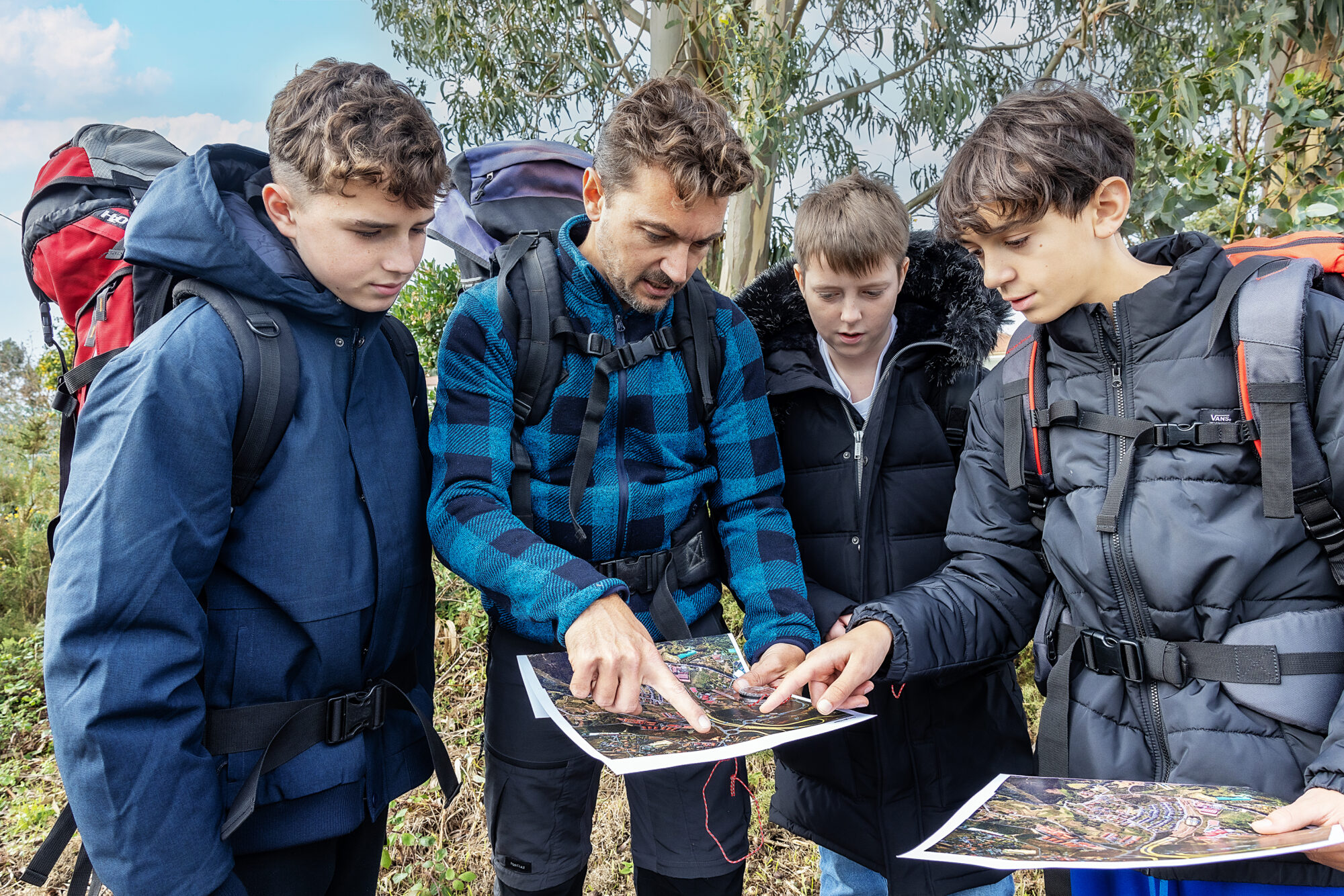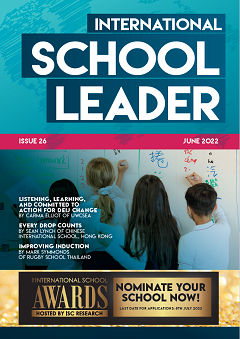By Oanh Crouch
Addressing Nature Deficit Disorder: Implementing The Journey across our network of schools.
The Problem: Nature Deficit Disorder
In today’s digital age, children are spending less time outdoors, leading to a term first coined by Richard Louv as “Nature Deficit Disorder. This “Vitamin N Deficiency” and disconnection from nature has been linked to various negative outcomes, including reduced physical activity, increased stress levels, and impaired cognitive development. It became evident that a structured approach to outdoor learning was necessary to combat these effects for our students.
The Solution: The Journey
To address Nature Deficit Disorder, “The Journey” was developed, an innovative outdoor learning programme implemented across our Globeducate network of schools. “The Journey” is designed to foster students’ academic and personal growth through direct interaction with nature, enhancing vital future-proof competencies of character development, collaboration, critical thinking, communication and creativity.
Having worked and lived in diverse countries like Australia, Thailand, the UK and Finland, I witnessed first-hand the positive impact outdoor learning provision has on students’ academic and personal achievements. It was from this direct experience that the “The Journey” was developed for our schools.
“The Journey” is a journey of discovery, whereby students learn about themselves, about each other, about our environment for them to become self-reliant, to solve problems and to challenge and push themselves outside of their comfort zones.
It is about how students have opportunities to learn with nature, through nature and from nature to support their development of key future competencies including collaboration, critical thinking, communication and creativity. “The Journey” is more than just taking learning outside. It is about experiential learning and understanding how to make informed choices on how to limit risks to ensure the safety of ourselves, of others and of our environment.
The Implementation of The Journey
1. Development of the Framework
“The Journey” is grounded in experiential learning principles, emphasizing self-reliance, problem-solving, and risk management. The programme spans from Early Years through Key Stage 5, structured around five core skills: shelter building, using knots, cooking outdoors including using fire, navigation and using tools. Additionally, students culminate their learning and participate in the Duke of Edinburgh and International Bronze, Silver and Gold award.
Our schools in Spain, Portugal, France and United Kingdom are committed to using this framework. These include:
- Boundary Oak School,
- Cambridge House British International School,
- O Castro British International School,
- Coruña British International School,
- IPS Cascais British International School,
- Mougins British International School,
- Nobel Algarve Almancil British International School,
- Nobel Algarve Lagoa British International School,
- St George´s British International School,
- and Stonar School.
It has been a joy to see how leaders and their teams have interpreted the framework to create their own bespoke programme tailored to the needs and contexts of their schools and students.

Photo: Coruña British International School
2. The Four Pillars
The approach is built on four pillars: Identity, Adventure, Nature, and Community:
- Identity: Through outdoor challenges, students explore and develop their identities, gaining insights into their strengths, limitations, and values.
- Adventure: Engaging in physically and mentally challenging activities promotes thinking and interacting “outside the box” to improve personal growth and resilience.
- Nature: Developing a deep and personalised connection with the environment, to understand ecological systems and the interconnectedness of all living things.
- Community: Collaborative activities foster communication, trust, and mutual support, enhancing social responsibility and a sense of belonging.
3. Leave No Trace Principles
A fundamental component of “The Journey” is instilling environmental stewardship through Leave No Trace principles. Students learn sustainable practices to protect and preserve natural ecosystems, fostering a lifelong commitment to environmental conservation.

Photo: Stonar School
Impact and Outcomes
Outdoor learning offers a rich environment for fostering the 5 Cs: Communication, Collaboration, Critical Thinking, Creativity, and Character Development.
- Communication: Outdoors, students engage in real-world communication scenarios. Whether it’s explaining a concept to a peer, discussing observations, or presenting findings from an outdoor problem-solving tasks, they learn to articulate their thoughts effectively.
- Collaboration: Working together in outdoor settings requires cooperation and teamwork. From navigating a trail to conducting field research, students must collaborate to achieve common goals, fostering essential social skills and empathy.
- Critical Thinking: The outdoors present endless opportunities for problem-solving and decision-making. Students must analyse situations, evaluate risks, and make informed choices. Whether it’s identifying animal tracks or designing a shelter, critical thinking skills are constantly challenged and developed.
- Creativity: Outdoor environments stimulate creativity by inspiring curiosity and imagination. Whether it’s using natural materials for art projects, inventing games, or designing outdoor structures, students are encouraged to think outside the box and explore their creativity in novel ways.
- Character Development: Outdoor learning fosters resilience, responsibility, and a sense of stewardship for the environment. Facing challenges such as adverse weather conditions or overcoming obstacles during outdoor activities helps build character and instil values like perseverance and environmental consciousness.
By integrating outdoor learning experiences that promote the 5 Cs, we can provide students with holistic and immersive learning opportunities that extend beyond the classroom walls, preparing them for success in both academic and real-world contexts.
In addition to the impact of character development, communication, collaboration, creative and critical thinking skills, we also noticed the following:
- Improved Academic Performance: Learning in natural environments stimulates curiosity and critical thinking and we noticed the increased engagement and motivation positively affected academic performance.
- Enhanced Physical Health: Outdoor activities promote exercise and movement, counteracting sedentary behaviours associated with indoor learning environments.
- Emotional Well-being: Nature has a calming effect, reducing stress and anxiety, especially with those students who displayed lack of attention in traditional classrooms. Exposure to green spaces improves mood and emotional regulation, providing a respite from classroom pressures.
- Increased Environmental Awareness: Direct interaction with nature fosters a deeper understanding of ecological systems and a sense of responsibility toward conservation. We noticed improved and increased engagement with sustainability projects with WWF and Eco School initiatives across our schools.

Photo: O Castro British International School
Practical Tips for School Leaders
- Start Small: Begin with simple outdoor activities and gradually introduce more complex challenges.
- Foster Inclusivity: Design activities that accommodate all students, regardless of physical ability, to ensure everyone can participate.
- Evaluate and Adapt: Regularly assess the program’s effectiveness and be open to making necessary adjustments based on feedback and observations from students, teachers and parents.
- Prioritize Safety: Ensure all activities are conducted safely, with proper risk assessments and safety protocols in place.
- Community Engagement: Involving the broader school community, including parents and local organisations, can enhance the programme’s impact and sustainability.
- Professional Development: Providing training for educators on outdoor learning principles and safety ensures effective implementation and maximizes student benefits.

Photo: Coruña British International School
By integrating “The Journey” into the curriculum, our schools have created a holistic learning environment that nurtures academic success, personal growth, and a profound connection with the natural world. This approach not only combats Nature Deficit Disorder but also equips students with essential skills and attitudes for a sustainable future.

Oanh Crouch is a Director of Education at Globeducate and leads on teaching and learning projects, in-service training, curriculum development, global events and virtual learning communities across the group. You can connect with her on X.




